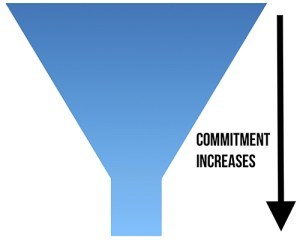Joe Fontenot's Blog, page 17
August 3, 2018
The value of downward forces
NEW: Every Friday, I’m doing church growth posts, where I look at practical ways you can get more people involved. I’m calling this “marketing.”
Here’s something we all know: In church, there are different degrees of commitment. Some show up all the time, others show up for Christmas and Easter.
Visually, we can think of this as a funnel.

At the top, there are a lot of people, but with low commitment. Then as you move down the funnel, commitment increases, but the number of people decreases.
The question is: what moves people from the top (low commitment) to the bottom (high commitment)?
The answer is a concept called downward forces.
In an actual funnel, there are physical properties that do this. Gravity and centripetal force. They are what make the penny go from the top to the bottom.
The same, too, is true for people-funnels. There are elements at play that help those who want to move lower to higher commitment do so.
Think for a minute, what compels a person to introduce your group to one of their friends?
Or, to put that another way: what parts of what you offer make your members’ lives substantially better?
When you find these elements, you’ve discovered why people come.
The next step is to be strategic–to build these into your planning.
This is a concept I talk more about in Minimalist Marketing.
The post The value of downward forces appeared first on Joe Fontenot.

August 2, 2018
Don’t burn bridges, napalm them
Sometimes we have to burn bridges. Like with toxic relationships. The problem is that a burned bridge can be rebuilt. And that’s not always good.
The better option? Napalm them.
Hear me out here.
Continuing the metaphor: when you napalm a bridge, it’s absolute. It’s overkill. There is just no going back.
And as a result, napalming bridges is a lot more serious.
If you commit to only napalming bridges—making the disconnection so obvious and clear that it could never be reconnected—then you’ll be careful about who you do this for.
Some relations are truly bad and you need to be separated. Go ahead and napalm those.
But a lot of shaky relationships just need some healthy space. Don’t burn those. Just back away for a while.
The post Don’t burn bridges, napalm them appeared first on Joe Fontenot.

August 1, 2018
Often God isn’t calling us to do big things
Moses spent most of his life dealing with little things.
He was born into royalty. He grew up with a passionate, but with an idealistic view of people. That got him into trouble when he thought he was helping his brothers by killing an Egyptian. They saw him as a hypocrite.
Then he ran. He spent the next four decades herding sheep.
It was only then that God called him to do something. Eighty years in.
Jesus–the savior of humanity–lived the first thirty of his thirty-three years doing normal stuff.
Most of the Old Testament profits got a message from God once, or a few times at most. It wasn’t an occupation for them, it was an exception.
Here’s the point: for most of our lives, God isn’t calling us to do big things. He’s calling us to do little things well. it’s all of the little stuff (the boring stuff) where we develop who we are in those big moments (the parts people write about).
It’s the ordinary that defines extraordinary.
And with that, it’s in our interest to do the best ordinary work we can.
The post Often God isn’t calling us to do big things appeared first on Joe Fontenot.

July 31, 2018
The paradox of making peace
“Blessed are the peacemakers”
– Jesus (Matthew 5:9)
For most of us, peace equals calm. It’s when we’re at rest.
But that’s the outcome, the result. The getting there is a different thing entirely.
The picture of peace that Jesus gave us was not magical, but balanced.
“Forgive, if you have anything against anyone” (Mark 11:25)
and
“Whatever you wish that others would do to you, do also to them” (Matthew 7:12)
It takes effort–sometimes a lot–to make peace.
Sometimes, even, it’s the hardest thing we will do.
Other times still, it will cost us more than we’re comfortable losing.
Jesus said:
“In me you may have peace. In the world you will have tribulation.
“But take heart;
“I have overcome the world.” (John 16:33)
It does no good to run away from this fight. No matter how hard it is.
No other alternative is better.
The post The paradox of making peace appeared first on Joe Fontenot.

July 30, 2018
iDol
My friend Andrew preached from Acts this past Sunday.
In the passage, Paul confronts the idol worshipers in Athens.
If you’ve been in church for any length of time, it’s clear where this is going: What are the idols in your life?
We get it. Anything that gets between you and God is an idol. My car, my money, my job.
But then, in front of us all, he confessed. His own idol: his phone.
And, holy crap, it hit me.
That’s me.
When I call, you come. No matter what you’re doing. I don’t care if you’re in the middle of a conversation with another person, or voicing a prayer to God–my ding requires your response.
That’s not the problem of faraway men in a faraway land. That’s me.
Is there any better idol today than the one we charge every morning and carry around in our pocket all day?
When we think about revival in our country, we think about everybody coming back to church.
And maybe it is.
Or…maybe revival just looks a bit more like a flip-phone.
The post iDol appeared first on Joe Fontenot.

July 27, 2018
In the land of criminals
“Go out and train everyone you meet, far and near, in this way of life”
– Jesus (Matthew 28:19)
It’s easy—and natural, even—to complain and be down about the bad.
I live in New Orleans. We often rank on things like the most murders per capita.
But stopping here leaves a lot on the table.
That’s because love and forgiveness make a much bigger impact in the places the need is most obvious.
So the real question is: where is the most obvious need, and are you there?
The post In the land of criminals appeared first on Joe Fontenot.

July 26, 2018
A note on divine interuptions
“Go and announce to them that the kingdom of heaven is near.”
– Jesus (Matthew 10:7)
My friend Rich spent a good chunk of his career as a manager. He learned something one day—something he told me—which changed the way I looked at work.
Divine interruptions.
I’m a productivity person. I like to get things done. And I plan out my day. But it never goes according to plan. People happen.
So I’ve either got two options:
Fight it, avoid it, ignore it. Or…
Treat it like God intended it to happen.
When we do the first, we get more of our own stuff done. Which is not a bad thing.
But when we do the second, we get more of God’s stuff done. And this, of course, is the better thing.
Divine interruptions are a way to get involved in Kingdom work wherever we are, whatever we’re doing.
So, how do you spot them?
Here’s the trick: you don’t.
You just treat every opportunity as a chance to encourage, teach, learn, serve, or give. And then it becomes it.
The post A note on divine interuptions appeared first on Joe Fontenot.

July 25, 2018
Fractal Living
“He has committed to us the message of reconciliation”
– Paul (2 Corinthians 5:19)
A fractal is a shape who’s parts are the same as the whole.
A six-sided snowflake that’s made up of six-sided arms. A Douglas Fir Christmas tree which cone-shaped branches. And the Moon orbiting the Earth while the Earth orbits the Sun.

The benefit of a fractal is that the system works at all levels.
The differences then, are not in value, but in application.
A railroad spike may be shaped just like the nails behind my picture frames (functionally they’re doing the same thing: bonding two disjointed pieces together). But their applications are quite different. And it’s the difference that matters.
This is the Christian life.
The impact we make is not a reflection of our placement (or scale).
Instead, our impact hangs on us doing what we were put here to do. Whether you work at a church, are a staffer at the White House, or hold a sign under the bridge, God’s given us each a job with the potential to alter eternity.
That job, fortunately, is pretty simple.
As Paul writes, it’s to keep telling the story.
Image David Milligan-Croft.
The post Fractal Living appeared first on Joe Fontenot.

July 24, 2018
“Hi, little boy”
“Hi, little boy.”
Graham cut his eyes at me as a four-year-old stranger stood waving at him.
When the boy left, Graham (who was both unamused and also five years old) told me, “he thinks I’m little. I’m not.”
My son was offended because in his mind “little boy” was a put-down.
But this smiling little four-year-old stranger saw things differently. In a world of adults, he saw someone else, just like him, and he was happy about it.
The funny thing is, we don’t outgrow this. Even into adulthood, we continue to believe that everyone we meet sees the world as we do. As if they’re making all the same assumptions. But this is almost never the case.
And the result usually looks something like conflict: insults, fights, and so on.
But what if our first assumption wasn’t that they’re seeing what we’re seeing. What if our first assumption–the one we give the benefit of the doubt to–was that they aren’t trying to hurt us?
How many of our daily headaches would evaporate with that one change? (And how many new friends would we make?)
My guess is, at least a few. And that, I think, is worth it.
The post “Hi, little boy” appeared first on Joe Fontenot.

July 23, 2018
The economics of giving vs taking
Taking is like a social debt.
What I do affects how my neighbors live. And the more globalized our world becomes, the more my neighbors become people in Africa and Asia and other places.
Giving, on the other hand, is more like an investment.
It’s not always one-to-one. Not everyone you help will help you back. So it’s hard to measure in the short term.
But have you ever noticed: no one ever mentions job titles at funerals? They always talk about what the person did for others. Even if they’re lying–that’s what they eulogize about.
The reason we act this way is because this is how God designed us. Sin comes from (our) taking. Salvation from (God’s) giving. It’s good to give.
Warren Buffet, the famous investor, reportedly makes every investment as if he plans to never sell it. Whether it’s literally true or not, that kind of philosophy has worked pretty well for him. $80 billion well.
The point: taking is finite. We can only handle so much. But giving is infinite. The more we do it, the better those around us are. The more we begin to think like our Creator. And, ironically, the stronger we become.
Living like this is a long-game. The key here is to focus on the process and not the outcome. The giving, not the getting.
P.S. Taking is not the same as accepting. Taking leave a void while accepting validates someone else’s giving.
The post The economics of giving vs taking appeared first on Joe Fontenot.




